MRRL Hall of Fame
BOSSMEN
- Details
- Category: Inductees
- Created: Friday, 09 April 2021 12:21
- Written by Gary Johnson
The Bossmen, led by the multi-talented Dick Wagner, became the most popular mid-Michigan band during the teen club era of the 1960’s with a combination of catchy original singles on a variety of small labels, a dynamic stage show, and a flair for promotion that epitomized the “do it yourself” ethic of self-sufficiency that would become more commonly associated with the punk rock movement a decade later. 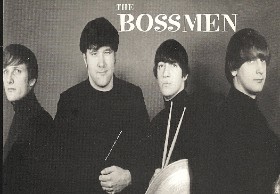 (L to R) Dick Wagner, Warren Keith, Pete Woodman, Lanny Roenicke
(L to R) Dick Wagner, Warren Keith, Pete Woodman, Lanny Roenicke
In addition, the band developed close relationships with radio DJs and press reporters to help get the word out. With their singles being played on AM radio stations across the state, the Bossmen soon developed a rabid following and a dedicated fan club that considered them trendsetters and mid-Michigan’s answer to the Beatles.
The band that became the Bossmen started out as the Playboys in 1962 in Saginaw, Michigan. The original lineup included Butch White on guitar and vocals, Lanny Roenicke on bass, and vocals, Pete Woodman on drums, Fred “Mr. Bo” LeMize on sax, and Tim Tompke on piano. The Playboys underwent an important lineup change when they met a talented pianist named Warren Keith at a gig in Pontiac. He quickly took the place of Tompke who was attending college and only playing part-time.
The Playboys were a cover band, playing the Top 40 hits of the day in bars including the Brown Derby in Midland and the Horseshoe in Saginaw; but they got a couple of name gigs as well, opening for Del Shannon and Jerry Lee Lewis at shows in Michigan.
Butch White, whose specialty was singing Roy Orbison songs, left the Playboys in 1964. He had a family to support, and he got a legitimate job as an apprentice iron worker and left the rock and roll life behind.
Needing a singer and guitarist, Warren Keith called Dick Wagner. Keith had played with Wagner in a Detroit area band called the El Dorados and convinced him to come to Saginaw and replace White in the Playboys. The band was soon playing regularly at a local watering hole called the Village Pump and packing the place every night. 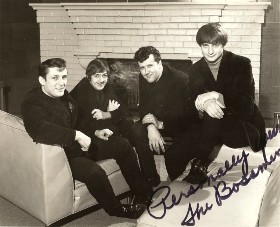 (L to R) Dick Wagner, Pete Woodman, Warren Keith, Lanny Roenicke
(L to R) Dick Wagner, Pete Woodman, Warren Keith, Lanny Roenicke
While in Saginaw, Wagner was inspired by hearing the Beatles on area radio stations to start writing songs. He also took over the leadership of the band and started adding Beatles’ songs to their sets.
Wagner got the band to change their name to the Bossmen, and the band recorded their first local hit, “Take A Look – (My Friend)” in Detroit in 1964. Saginaw businessman Tom Shively paid for the recordings as well as a trip to Nashville to meet with Dino Productions. The company took Shively’s money, released the song on their Soft label with false promises to promote it nationwide.
The Bossmen acquired very important allies in the persons of Bob Dyer and Dick Fabian from WKNX-AM of Saginaw. The popular DJs caught the band at the Village Pump and started playing “Take A Look – (My Friend)” regularly. It eventually reached #1 on the WKNX survey and put the Bossmen on the map in mid-Michigan. Listen to "Take A Look - (My Friend)" https://www.youtube.com/watch?v=heSoetSzJeA
By the time that the band released their second single, “Help Me Baby” and “Thanks To You” on the M & L label, a Bossmen appearance was a big event. The band filled engagements at the main teen music spots in the Tri-Cities: Roll-Air and Band Canyon in Bay City, the Blue Light in Midland, Daniel’s Den in Saginaw, and the Saturday night "Y" A Go-Go dances hosted by Bob Dyer and Dick Fabian at the Saginaw Y.M.C.A. 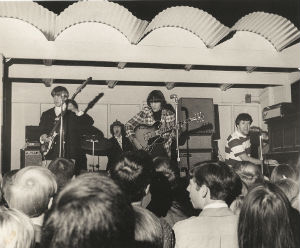 The Bossmen at Roll-Air in Bay City
The Bossmen at Roll-Air in Bay City
Besides playing their original songs, Beatles’ covers, and interesting interpretations of the hits of the day, the Bossmen also had an interesting stage show. Some of the antics included Warren Keith pouring lighter fluid on his piano keys and igniting them during his rendition of “Great Balls Of Fire” or Lanny Roenicke using the same substance to blow flames out of his trumpet.
The “Ringo” role in the Bossmen was ably filled by flamboyant drummer Pete Woodman. Born without fingers and with a cleft palate, Woodman possessed a very positive attitude and never let his disabilities get in the way of his great drumming and showmanship. Woodman even did a tap dance routine in one of the skits that the band incorporated into their sets.
The key player in the Bossmen, however, was Dick Wagner. He wrote most of the songs and produced all of the band’s recordings. As soon as the Bossmen put out a new 45, Wagner would get in his car and drive around the state distributing copies to DJs, promoters, and record stores on consignment. He was also constantly on the phone lining up gigs and promoting the band to anyone who would listen while also keeping close contact with the Bossmen fan club by providing photos and even poetry to the club’s newsletter. 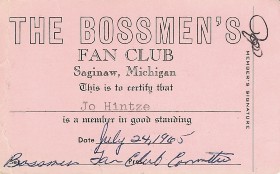 Jo Hintze - Bossmen Fan Club member
Jo Hintze - Bossmen Fan Club member
Wagner, being a little older and more experienced than most of the other bands playing with the Bossmen on the teen club circuit, was both an inspiration and mentor to many young musicians. He provided songs and record production for a variety of Michigan groups during this time including the Bells of Rhymny/Cherry Slush, the Pack, Our Generation, Tonto & the Renegades, the Paupers, the Sand, Elation Fields, the Beau Jens, and Count & the Colony.
The Bossmen enjoyed another two-sided mid-Michigan hit with their third single, “Bad Girl” and “Here’s Congratulations” in 1965 on Dick Wagner’s Dicto vanity label. According to Woodman, the Bossmen drew big crowds as they began playing all over the state, traveling to gigs in the Traverse City area, Grand Rapids, Lansing, Flint, and even the Grande Ballroom in Detroit in 1966. 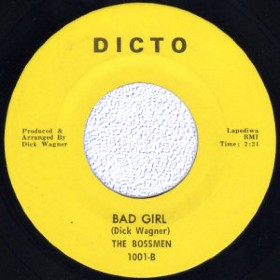 "Bad Girl" 45
"Bad Girl" 45
During this time, Dyer and Fabian used their connections to take the Bossmen to New York to audition for some major labels. Unfortunately, the A & R people they met with declined to sign the band, saying that they sounded too much like the Beatles.
Their fourth single, the rocking “Wait And See”, came out on the Lucky Eleven label out of Flint. Although the single was distributed nationally by Cameo-Parkway, it failed to chart nationally. “Wait And See” would be a big regional hit, however, but the flipside, “You’re The Girl For Me,” would get the Bossmen in the movies over 40 years later when it became part of the plot of a 2008 Hollywood horror film called Parasomnia. Listen to "Wait And See" https://www.youtube.com/watch?v=VEcQA2I3T3M
William Malone is a film director best known for his 1999 remake of the horror film House On Haunted Hill. Malone was born in Lansing, Michigan, and during his high school years in the 1960’s he played in a Beatles-inspired band called the Plagues that released some singles that were produced by Dave Kalmbach at his Great Lakes Recording Studio in Sparta, Michigan. 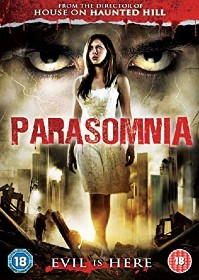 Parasomnia
Parasomnia
Malone was a big fan of the Bossmen and, when he began writing the script for Parasomnia, he decided to incorporate some of his memories of the vibrant Michigan music scene of that era.
In his script, one of his main characters, Danny Sloan, works in a record store, collects vinyl 45s, and is searching for an original copy of the “You’re The Girl For Me”/"Wait And See" single by the Bossmen during the movie.
Dick Wagner was living in Arizona during the time the film was being made, and Malone had him come to Hollywood to re-record "You're The Girl For Me" exactly like the 45 from 1966. Heard at the conclusion of the 2008 film, Malone started out with the original version and then segued into Wagner's new recording of the song. The soundtrack also includes a snippet of the Bossmen's original recording of "Bad Girl".
On September 7, 1965, Pete Woodman was charged in Flint in a two-count warrant for unlawful possession and sale of marijuana. At that time, it was a big scandal for the Bossmen, and Dick Wagner fired the popular drummer and brought in Jim Scalp to replace him until the case was resolved.
He was set up for the bust by the keyboard player for a popular Flint band called Lafayette & the LeSabres who was already in drug trouble with the police. According to Woodman’s girlfriend and future wife, Susie Kane, Woodman didn’t know that the pot he was selling was the same thing as the illegal substance marijuana. As unlikely as it might seem that Woodman didn't know that pot and marijuana were the same, 1965 was still a pretty innocent time in mid-Michigan, and most young people, like Woodman, had little knowledge of, or experience with, the drug scene.
Woodman got a break when the narcotics bureau allowed him to plead guilty to possession charge and dropped the far more serious charge of sale of marijuana. Woodman had to pay a fine but was allowed to leave the state, and he didn't have to report to a parole officer. 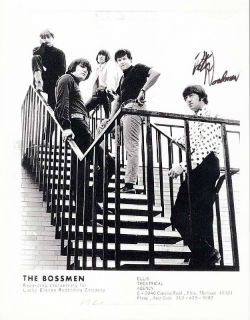 (L to R) Lanny Roenicke, Dick Wagner, Mark Farner, Warren Keith, Pete Woodman
(L to R) Lanny Roenicke, Dick Wagner, Mark Farner, Warren Keith, Pete Woodman
The band survived the scandal and in 1966, after Woodman returned, they added a new member when Mark Farner left Terry Knight and the Pack and was invited to join the Bossmen. Wagner became his mentor, and Farner wrote his first song, “Heartbreaker”, at Wagner’s apartment in Saginaw. Farner also appeared on the band’s last great single, “Baby Boy”. When the 45 failed to chart outside of Michigan, Wagner started looking for a new direction. Listen to "Baby Boy" https://www.youtube.com/watch?v=vwr4fn5X0wg
By the middle of 1966, Wagner was writing songs that he felt were beyond what he been doing with the Bossmen. By the end of the year, the original Bossmen were history and Wagner recruited drummer Bobby Rigg, guitarist Donny Hartman, and bassist Jack Smolinski of the Chevelles to form a new band. They performed at venues throughout Michigan under a variety of names including the New Bossmen, Dick Wagner and the Bossmen, and then Dick Wagner & the Frosts.
“Rainy Day", "Little Girl", and “Sunshine”, all released on Date Records (a subsidiary of Columbia Records), clearly showed that Wagner's compositions had moved to another level. Wagner then replaced Jack Smolinski with Gordy Garris of the Beau Jens, shortened the band’s name to the Frost, and signed with Vanguard Records. The group would go on from there to become one of Michigan's most popular and respected rock bands. The Frost recorded three highly regarded, but commercially unsuccessful, albums befoe they broke up in 1970. 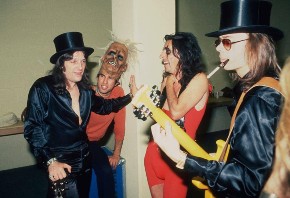 Dick Wagner backstage with Alice Cooper and Steve Hunter
Dick Wagner backstage with Alice Cooper and Steve Hunter
Wagner went on to record one album with Ursa Major, and he then did a good deal of impressive session work, playing on albums by the Alice Cooper band, Lou Reed, Kiss, Peter Gabriel, and Aerosmith before achieving his greatest songwriting success as the co-author of some of the biggest hits of Alice Cooper's solo career.
Sadly, Dick Wagner passed away in 2014, at the age of 71, of respiratory failure following a cardiac procedure.
Following the break-up of the Bossmen, Warren Keith went on to be Hank Williams Jr’s piano player. Keith, who had issues with both alcohol and depression, died unexpectedly of a heart attack while on the road. Lanny Roenicke has run his own business in Saginaw for many years but has suffered from some health issues in recent years.
Pete Woodman went on to form the Bean Machine with Susie Kane before taking over as the drummer in ? and the Mysterians after Eddie Serrato was seriously injured in a car accident. He and Susie then traveled to California where they met and teamed up with Meat Loaf, Frank Montoya, and Rick Bozzo to form a band called Meatloaf Soul.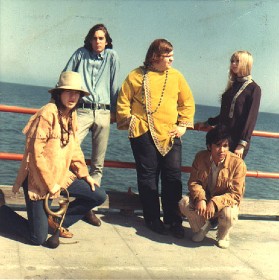 (L to R) Pete Woodman, Rick Bozzo, Meat Loaf, Frank Montoya, Susie Kane
(L to R) Pete Woodman, Rick Bozzo, Meat Loaf, Frank Montoya, Susie Kane
Renaming themselves the Popcorn Blizzard, the band came to Michigan in 1968. They recorded one single, “Once Upon A Time” and “Hello”, at Art Schiell’s small studio in Bay City before changing their name to the Floating Circus.
After the Floating Circus broke up, Meat Loaf signed with Motown's Rare Earth label and recorded as part of the duo Stoney & Meatloaf. Rick Bozzo went on to replace Gordy Garris in the Frost. In 1971, Pete and Susie joined the Grand Band in Detroit and were married in 1974.
The Bossmen were Historical Inductees as part of the 2021 class of the MRRL Hall of Fame. The band’s biggest single, “Baby Boy,” was selected as a Legendary Michigan Song that same year.
Main Sources:
When The Kids Stopped Dancing by Robert White
Not Only Women Bleed, Vignettes From The Heart Of A Rock Musician by Dick Wagner
